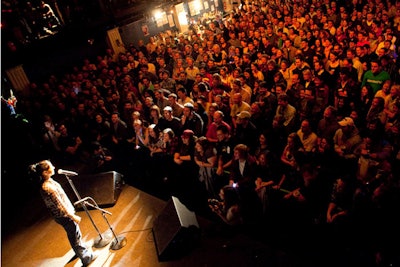
For a growing number of online properties like LivingSocial, Brightest Young Things, and Groupon, events have evolved from being a way to build a following offline, to an additional revenue source and a key part of the brand's identity. Just as pop-up shops serve retailers as a buzzy, experiential way to sell products, ticketed "urban adventures," warehouse sales, food festivals, and other affairs are proving central to growing the influence and geographical scope of these businesses. And such companies—all start-ups just a few years ago—are rapidly taking over the event landscape in major markets.
“I think it’s a very natural progression,” says Alex Michael, LivingSocial’s general manager for entertainment. The Washington, D.C.-based company, which sells discount deals to local venues and live events, realized it made sense to plan some of the events it sells. “The LivingSocial mantra has always been connecting people to their local community, and live events offer an opportunity to further that connection."
Unlike, say, the swanky, invite-only parties hosted by print magazines such as Travel & Leisure and Food & Wine, LivingSocial's events are aimed at average consumers, who typically don’t see them as branding events, but activities they’re willing to pay for. A LivingSocial beer festival in D.C. this April sold 5,000 tickets "before we sent a single email," says Michael, and the model has been spun off into festivals in Atlanta and Brooklyn.
Michael compares the company's strategy to how HBO transformed from a content broadcaster to a content producer. "They began by running other people's movies, and then had the epiphany that to remain interesting, they had to introduce their own concepts," he says. "Living Social made a similar transition: from selling other people's events to producing our own."
Similarly, Brightest Young Things, which started as a blog tracking the D.C. party and nightlife scene, added a local event calendar and quickly transitioned into live events.
“We never had big plans to be event producers,” says Cale Charney, the site’s event manager. “I was already DJing around town, so it was only natural to treat these as semi-official B.Y.T. DJ nights. We eventually started throwing our own small events.” These included a Web site redesign launch party and a local apparel designer showcase. “These early events were thought of as primarily audience-building exercises for the Web site, but as the scale and scope grew, B.Y.T. events began to be about half of the equation and turned into a source of revenue for the company.”
The brand recently organized pool parties, a lounge at Fashion’s Night Out, and a four-day comedy festival featuring Sarah Silverman and Patton Oswald, and is expanding to New York, an ambitious move considering the city is already crowded with events and consumer-targeted promotions.
Noelle Provencial, Groupon's senior manager of experiential marketing and events, says her company has followed a similar tack. "Part of our overall brand is getting out and exploring the city. Early on, we started doing events, just to grow our [email list] and get our name out there. Now we sell them as deals, and that offsets some of the costs."
In addition to planning and producing movie night at Wrigley Field and Camp Groupon in its home base of Chicago, Groupon also works to integrate itself into gatherings hosted by other organizations. At the recent North Coast Music Festival, which the brand sold tickets to, projections adjacent to the main stage showed Groupon Now deals for events taking place after the show. The approach worked well, says Provencial, "because it's not just shameless promotion. It's something nearby, something you might want to do anyway. It comes across as: 'We’re thinking about the rest of your night, too.'"
For each of these companies, keeping the event production in-house ensures the brand identity remains consistent throughout. "Our event team, we're not just looped in to execute someone else's goals," Provencial says. "From the beginning, we're coming up with the ideas, and seeing them through to the end. I think that’s quite different from a lot of brands."
And as these online properties grow their experiential efforts, other companies want to be associated with them, attracted by the success of such gatherings and the typically young creative types who attend.
LivingSocial, which recently partnered with Madison Square Garden and sports and entertainment company AEG to expand its reach to New York, and which has an exclusive agreement with the Dallas Cowboys to offer unique experiences to its Texas members, took its event model a step further by opening 918 F Street in February. The 27,000-square-foot, six-story event complex in Washington was introduced as a facility for the brand and its merchant partners to host pop-ups, classes, and other activities. This included the June “sushi, sake, and sumo” event, which promoted the Yo!Sushi chain’s entry into the U.S. market and had wrestling demos between courses. The event was ticketed, and Living Social sold several hundred seats. Impressive, considering a new restaurant brand might shell out considerable sums to get hundreds of locals to attend a free preview event. In this case, the traditional practice was flipped, with attendees paying for the privilege.
"The event alone couldn’t have generated that kind of excitement," Michael says. "But attach it to LivingSocial, and the millions of people we reach in Washington, D.C. area, and you’ve got a different story."



















